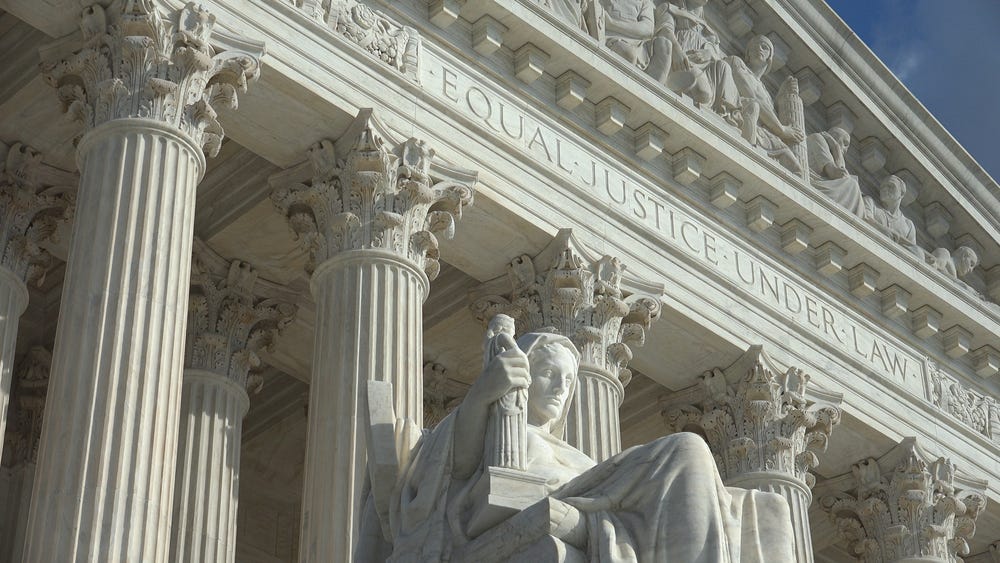E-Pluribus | January 14, 2022
Stretching "academic freedom" beyond recognition; the Supreme Court and limits on the federal government; and wrong, or just a different point of view?
A round up of the latest and best writing and musings on the rise of illiberalism in the public discourse:
Chance Layton: Does In-Person Instruction Violate Academic Freedom?
There are many threats to academic freedom, but Chance Layton writing for Minding the Campus says requiring teachers to teach in-person isn’t one of them. Crying wolf does nothing but detract from the real issues of free expression the academic community is facing today.
Such cases are becoming ever more common. And yet, a handful of instructors are abusing the one resource that professors have for challenging censorious university administrators.
The UA instructors claim that “[a]ny attempt to prevent instructors […] from using pedagogical techniques and technologies that are standard tools of the COVID pandemic era and pre-COVID teaching […] is an infringement on our academic freedom.” The pretense of such an argument stems from a 2009 Committee on Academic Freedom and Tenure document that establishes a faculty right to academic freedom, including protection “from any and all arbitrary interferences with their ability to carry out their missions in research, creative activities, teaching, service and outreach.”
This brings us to the question: Is mandatory in-person instruction a violation of academic freedom?
The short answer is “no.” In no way is requiring in-person classes a violation of the academic freedom contract between the university and its faculty.
The 1915 Declaration of Principles, the founding document of the American Association of University Professors (AAUP), establishes academic freedom as “the liberty of [a] scholar within the university to set forth his conclusions.”
[…]
It’s obvious from this document that academic freedom exists to protect faculty from censorship, not COVID. So, in this case, the freedom afforded to the petitioning instructors allows them the right to criticize their institution’s handling of COVID, but it does not void their obligation to teach students in person.
Academic freedom is not license to teach however one wants. It is a freedom for scholars to publish, write, and say what they must, provided that their works are the “fruits of competent and patient and sincere inquiry.” Using academic freedom as a “get out of work” card bastardizes the concept.
Read the whole thing.
Eric Boehm: Supreme Court Blocks Biden Vaccine Mandate: 'This Is No "Everyday Exercise of Federal Power"'
The pandemic has raised questions about the use of government power, both state and federal. Eric Boehm at Reason writes that in striking down the Biden administration’s broad OSHA-enforced vaccine mandate but upholding the narrower health care worker mandate, the justices have concluded that while emergency measures have their place, the government is still bound by the Constitution’s separation of powers.
Beyond the legal and constitutional questions, Biden's mandate also raised worrying philosophical questions about the limits—or lack thereof—on government power and the ramifications of its use in these circumstances. "Forcing vaccines on a minority contingent of unwilling people is a huge error that risks shredding the social fabric of a country already being pulled apart by political tribalism," Reason's Robby Soave wrote in The New York Times in September. "The president should not—and most likely does not—have the power to unilaterally compel millions of private-sector workers to get vaccinated or risk losing their jobs: Mr. Biden is presiding over a vast expansion of federal authority, one that Democrats will certainly come to regret the next time a Republican takes power."
In the end, the five-month saga of Biden's private-employer vaccine mandate highlighted just about all of the major problems with how the federal government operates these days. Here was a major policy change implemented not by the legitimate legislative authority (Congress) but by the executive branch, which increasingly sees its authority as covering anything that's not been explicitly forbidden. Congress then stood by and waited for the Supreme Court to invalidate the order, effectively forcing nine legal scholars to do its job.
Read it all here.
Ilana Redstone: The Fallacy of Equal Knowledge
At City Journal, Ilana Redstone explores the Fallacy of Equal Knowledge phenomenon, which she defines as “the unstated assumption that if we all had the same information, we’d all agree.” Redstone does not discount ignorance as a factor in the diversity of opinions on any given issue, but says that when we cannot accept that someone simply has reached different conclusions, we contribute to the breakdown in civil communication.
Assuming someone disagrees with a particular political position or claim because they’re ignorant is a challenge I encounter frequently. By way of context, much of my job involves facilitating conversations about topics that make people uncomfortable. The fallacy of equal knowledge tends to emerge among people used to thinking in a specific way about hot-button political topics. When they consider a view such as opposition to affirmative action, the idea that gender-dysphoric children may be influenced by peers, or even opposition to Covid mandates, they suggest that ignorance could explain such thinking.
However, when treated as a default supposition, this outlook can stand in the way of constructive engagement. It is grounded in the often-false assumption that what divides people on controversial social issues is misinformation. It then creates the idea that giving those with opposing views more or better information must be the solution.
To be clear, sometimes ignorance is a real obstacle. But recognizing that point doesn’t mean believing that all differences on controversial questions can be solved by simply getting everyone on the same page with respect to what they know about the world. No one likes to be treated—or condescended to—as though they simply don’t know any better, but the fallacy of equal knowledge does just that. It fails to take opposing values seriously.
[…]
Ultimately, these programs are based in the assumption that, by imparting information about the importance of unconscious bias and the need to adopt an antiracist stance, previously reluctant people will see the error of their ways. But this commits the fallacy of equal knowledge by assuming that the same information will lead people to the same position on these issues.
Read it all.
Around Twitter
Michael Tracey and Glenn Greenwald on the abuse of “sedition” charges:
Abigail Shrier, author of Irreversible Damage: Teenage Girls and the Transgender Craze, finds some vindication in… the New York Times:
Finally, via Cathy Young, Yair Rosenberg in the Atlantic on what culture critics often miss:













